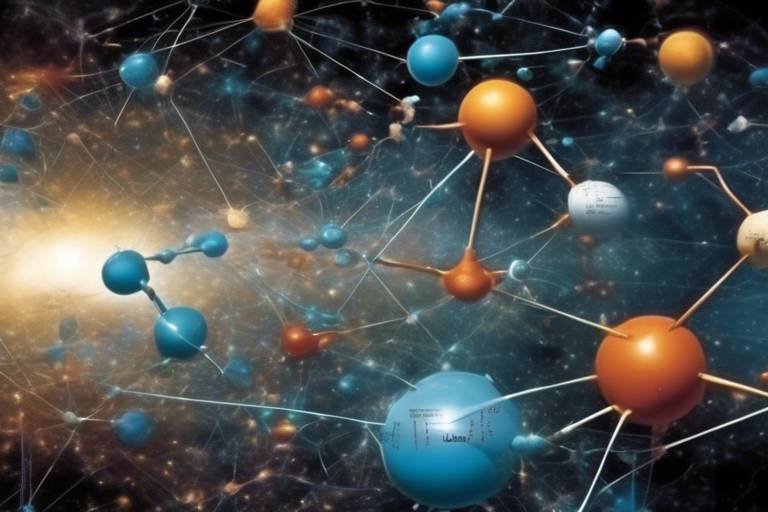How can Ontology Shed Light on Human Existence?
Ontology, at its core, is the philosophical study of being and existence. It's a fascinating field that dives deep into the essence of what it means to be alive, to exist, and to have identity. When we ponder our place in the universe, we often find ourselves grappling with profound questions: What does it mean to exist? Are we merely physical beings, or is there more to our essence? These inquiries are not just academic; they resonate with our daily lives, influencing how we perceive ourselves and our relationships with others.
Imagine standing at the edge of a vast ocean, staring into the horizon. The water represents the vastness of existence, while the waves symbolize the myriad experiences that shape our understanding of life. Just as the ocean is made up of countless drops of water, our existence is composed of moments, memories, and interactions that define who we are. Ontology helps us navigate these waters, providing a framework to understand the complexities of our being.
One of the most intriguing aspects of ontology is its ability to bridge the gap between the abstract and the tangible. It encourages us to explore the **intricacies of identity**, the **nature of reality**, and the **interconnectedness of all beings**. By examining these elements, we can begin to appreciate the rich tapestry of human existence. This exploration not only enhances our understanding of ourselves but also fosters empathy towards others, as we realize that everyone is navigating their own unique journey through existence.
As we delve deeper into the relationship between ontology and human existence, we uncover various philosophical perspectives that have emerged throughout history. From the ancient Greeks, who pondered the nature of being, to modern thinkers who challenge conventional notions of identity, the discourse around ontology is both dynamic and evolving. This ongoing dialogue invites us to question our assumptions and encourages a more profound exploration of what it means to be human.
In essence, ontology is not merely an academic pursuit; it is a lens through which we can examine our lives and the world around us. By engaging with ontological questions, we embark on a journey of self-discovery, seeking to understand our place in the cosmos and the significance of our existence. As we navigate this journey, we may find that the answers we seek are not definitive but rather a series of insights that shape our understanding of life itself.
Understanding the fundamental nature of being is crucial in ontology. This section examines various philosophical interpretations of existence and their relevance to human life.
Ontology categorizes entities and their relationships. Here, we explore the different categories and how they help us understand the complexities of human existence.
This subheading discusses the concepts of substance and essence, highlighting their significance in defining what it means to exist as a human being.
Exploring the relationship between identity and continuity, this section considers how ontological perspectives shape our understanding of personal identity over time.
This section addresses fundamental existential questions that arise from ontological inquiries, such as the purpose of existence and the nature of reality.
Social ontology examines the collective aspects of existence, focusing on how social structures influence individual identities and experiences.
The connection between ontology and consciousness is profound. This section explores how our understanding of existence impacts our perception of consciousness and self-awareness.
Various philosophical perspectives on consciousness are discussed here, emphasizing the role of ontology in shaping our understanding of mental states and experiences.
The implications of ontology for artificial intelligence are significant. This section explores how ontological frameworks can guide the development of AI systems that understand human existence.
- What is ontology? Ontology is the philosophical study of being and existence, exploring what it means to exist.
- How does ontology relate to human existence? Ontology provides a framework to understand the complexities of identity, reality, and our place in the universe.
- Why is understanding ontology important? Understanding ontology helps us navigate our experiences, fosters empathy, and encourages self-discovery.
- Can ontology influence artificial intelligence? Yes, ontological frameworks can guide AI systems in understanding human existence and consciousness.

The Nature of Being
Understanding the fundamental nature of being is crucial in ontology. It’s like peeling back the layers of an onion—each layer reveals something deeper about existence and our place within it. Philosophers have pondered this question for centuries, asking, “What does it mean to exist?” These inquiries are not just academic; they resonate deeply with our everyday experiences and shape how we perceive ourselves and the world around us.
At the heart of this exploration lies the distinction between existence and essence. Existence refers to the state of being, the fact that something is present in reality. Essence, on the other hand, delves into the qualities and characteristics that define an entity. Think of it this way: a chair exists, but its essence—what makes it a chair—includes its structure, purpose, and the materials from which it's made. Similarly, our essence as humans encompasses our thoughts, emotions, and interactions. This duality raises questions about whether we are defined by our existence or by our essence.
The philosophical interpretations of existence vary widely. Some thinkers, like Jean-Paul Sartre, argued that existence precedes essence, suggesting that we first exist and then define ourselves through our actions and choices. This perspective emphasizes the importance of personal responsibility and the freedom to shape our identities. In contrast, others, like Aristotle, believed in a more intrinsic essence that defines what it means to be human. This dichotomy creates a rich tapestry of thought, inviting us to reflect on our own lives and the forces that shape our identities.
Moreover, the relevance of these interpretations extends beyond philosophy into our daily lives. Consider how your understanding of existence influences your decisions. When faced with choices, do you act based on your essence—your values and beliefs—or are you more focused on the immediate consequences of your existence? This interplay between existence and essence can lead to profound insights about who we are and how we navigate the complexities of life.
In contemporary thought, the nature of being has significant implications for our understanding of identity and self-awareness. As we grapple with our individual and collective identities in a rapidly changing world, the questions posed by ontology become even more pressing. How do our relationships with others influence our sense of self? How does culture shape our essence? These inquiries not only challenge us to think deeply but also encourage us to engage with the world around us in meaningful ways.
Ultimately, the exploration of the nature of being is a journey that invites us to question, reflect, and grow. It’s a reminder that existence is not merely a state of being; it’s a dynamic interplay of experiences, choices, and relationships that define who we are. As we continue to delve into these philosophical inquiries, we may find that understanding our existence is the key to unlocking a richer, more fulfilling life.

Ontology, at its core, is about categorizing the essence of existence. Think of it as a vast library of everything that exists, where each book represents a different category of being. These categories help us navigate the complexities of our world and understand our place within it. By breaking down existence into manageable parts, we can explore the intricate relationships between various entities. This categorization is not just an academic exercise; it profoundly influences how we perceive ourselves and our interactions with the world around us.
One of the fundamental ontological categories is the distinction between substance and essence. Substance refers to what something is made of, while essence pertains to what it fundamentally is. For instance, consider a chair. Its substance might be wood or metal, but its essence is that it serves the purpose of providing a place to sit. This distinction is crucial in understanding human existence. We are not merely biological organisms; our essence encompasses our thoughts, emotions, and experiences, which shape our identities.
Another vital category is the concept of identity. How do we define ourselves over time? This question leads us to explore the relationship between identity and continuity. Just as a river flows yet remains the same body of water, we too experience changes while maintaining a sense of self. Our memories, relationships, and experiences contribute to our ongoing narrative, creating a tapestry of identity that is both unique and complex.
Furthermore, ontological categories extend into the realm of social ontology, which examines the collective aspects of existence. This perspective emphasizes how social structures and cultural contexts influence individual identities. For example, consider how different cultures categorize relationships—some may prioritize family ties, while others may emphasize friendships or professional networks. These social categories shape our understanding of who we are and how we relate to others.
Ultimately, the exploration of ontological categories provides a framework for understanding the multifaceted nature of human existence. By recognizing the various ways we categorize and interpret our world, we can gain deeper insights into our identities and the relationships we forge with one another. This understanding is not static; it evolves as we navigate through life, continually reshaping our perceptions of ourselves and the universe.
- What is ontology? Ontology is the philosophical study of the nature of being, existence, and reality, focusing on categorizing entities and their relationships.
- Why are ontological categories important? They help us understand the complexities of existence and provide a framework for exploring our identities and relationships with others.
- How does ontology relate to identity? Ontology examines the nature of being, which includes how we define and perceive our identities over time.
- What is social ontology? Social ontology studies how social structures and cultural contexts influence individual identities and experiences.

Substance and Essence
When we dive into the rich waters of ontology, two terms often bob to the surface: substance and essence. These concepts are not just philosophical jargon; they form the bedrock of our understanding of existence itself. Imagine substance as the stuff that makes up reality—everything that physically exists, from the tiniest atom to the vastness of the universe. On the other hand, essence is like the soul of a thing, its intrinsic nature that defines what it truly is. Think of it this way: if substance is the clay, essence is the sculpture that emerges from it. Without the clay, there can be no sculpture, but without the sculptor’s vision, the clay is just a lump.
The interplay between substance and essence raises fascinating questions about our own existence. For instance, what does it mean to be human? Are we merely a collection of biological substances, or is there something deeper that defines our humanity? This leads us to explore the idea that while our physical bodies (substance) are essential for our existence, our thoughts, emotions, and consciousness (essence) are what truly make us who we are.
To further illustrate this relationship, consider the following table that outlines key differences between substance and essence:
| Aspect | Substance | Essence |
|---|---|---|
| Definition | The physical matter that composes an entity | The fundamental nature or characteristic of an entity |
| Examples | Atoms, molecules, biological organisms | Consciousness, identity, purpose |
| Philosophical Implication | Focuses on the tangible | Focuses on the intangible |
This distinction is crucial when we consider the implications for our identity. Our substance may change over time—our cells regenerate, our physical appearance alters, and our experiences accumulate—but the essence of who we are can remain constant. This brings us to the concept of personal identity, which is often tied to our memories and experiences rather than our physical form. It raises questions like: If I change my body completely, am I still the same person? The answer often hinges on how we perceive essence in relation to our substance.
Moreover, the philosophical exploration of substance and essence doesn’t just stop with humans. It extends to all entities, including animals, plants, and even artificial constructs. For example, consider a robot designed to mimic human behavior. Its substance is the metal and circuits that make it up, but what about its essence? Can it possess a form of consciousness or identity? This inquiry leads us down a rabbit hole of existential questions that challenge our understanding of life itself.
In conclusion, the relationship between substance and essence is a dynamic and complex one. As we navigate through the philosophical landscapes of ontology, we must consider how these concepts shape our understanding of existence, identity, and ultimately, what it means to be human. So, the next time you ponder your own existence, ask yourself: Are you merely a collection of substances, or is there an essence that defines you beyond the physical?
- What is the difference between substance and essence? Substance refers to the physical components that make up an entity, while essence refers to the intrinsic nature or qualities that define what that entity truly is.
- Can essence change over time? While our physical substance may change, many believe that our essence—our core identity and values—remains relatively stable throughout our lives.
- How do substance and essence relate to artificial intelligence? The discussion of substance and essence in AI raises questions about whether machines can possess consciousness or identity akin to humans.

Identity and Continuity
When we dive into the concepts of identity and continuity, we are essentially peeling back the layers of what it means to be human. Imagine your life as a river, flowing continuously through time. Each moment, each experience, is like a drop of water contributing to the overall current. Yet, despite the constant flow and change, we still recognize the river as the same entity. This metaphor beautifully illustrates how our identities, while constantly evolving, maintain a sense of continuity.
From an ontological perspective, the question arises: What makes us the same person over time? Is it our memories, our physical bodies, or perhaps our consciousness? Philosophers have long debated this topic, with various schools of thought offering different insights. Some argue that our memories are the bedrock of our identity, forming a narrative thread that connects our past selves to our present. Others suggest that it is our physical continuity, our bodies, that anchor us in time, despite the inevitable changes we undergo.
To illustrate these perspectives, consider the following table that summarizes key philosophical views on identity:
| Philosopher | View on Identity |
|---|---|
| John Locke | Identity is tied to memory and consciousness. |
| David Hume | Identity is a bundle of perceptions; there is no true self. |
| Gottfried Wilhelm Leibniz | Identity is based on the principle of the indiscernibility of identicals. |
Moreover, the relationship between identity and continuity is not just a philosophical abstraction; it has real-world implications. For instance, think about how we perceive ourselves as we age. Our childhood selves, teenage selves, and adult selves all seem to inhabit the same identity, even though our thoughts, beliefs, and appearances have changed dramatically. This continuity is crucial for our sense of self; without it, we might feel like a collection of disjointed experiences rather than a cohesive being.
Furthermore, the concept of identity continuity plays a significant role in how we relate to others. Our interactions and relationships are often built on the assumption that we are the same person we were yesterday, last year, or even a decade ago. This assumption fosters trust and understanding in our social interactions. However, as we grow and evolve, the question arises: How do we reconcile our past selves with our present identities?
Ultimately, the exploration of identity and continuity leads us to ponder deeper existential questions. Are we defined solely by our past, or do we have the agency to shape our future selves? Does continuity imply stagnation, or can it coexist with growth and transformation? These questions invite us to reflect on our own lives and the narratives we construct.
- What is the difference between identity and continuity? Identity refers to the characteristics that define a person, while continuity refers to the unbroken connection of those characteristics over time.
- Can a person's identity change over time? Yes, a person's identity can change due to various factors such as experiences, relationships, and personal growth.
- Why is continuity important for identity? Continuity provides a sense of stability and coherence in our understanding of ourselves, allowing us to navigate our lives meaningfully.

Existential Questions
When we dive into the realm of ontology, we inevitably stumble upon a myriad of that have puzzled humanity for centuries. Questions like "What is the purpose of existence?" and "What does it mean to be human?" echo through the halls of philosophy, compelling us to reflect on our own lives. These inquiries are not just abstract musings; they are deeply personal, touching the very core of our being. Think about it: every time you gaze at the stars or contemplate your place in the universe, you are engaging in an ontological exploration.
Existential questions often lead us to ponder the nature of reality itself. Are we merely biological machines, or is there something more profound that defines our existence? This is where ontology plays a pivotal role. It invites us to dissect the layers of our reality, pushing us to question the essence of our thoughts, emotions, and experiences. For instance, consider the following questions:
- What constitutes a meaningful life?
- Is there a universal truth that binds all human experiences?
- How do our relationships shape our understanding of existence?
These questions not only challenge our perceptions but also illuminate the intricate web of relationships that define our existence. They compel us to explore the interconnectedness of our lives, urging us to consider how our individual narratives contribute to the broader tapestry of human experience. As we seek answers, we often find ourselves reflecting on our values, beliefs, and the legacies we wish to leave behind.
Moreover, the quest for meaning can lead us to confront uncomfortable truths about ourselves and our societies. It forces us to grapple with concepts like mortality and the transient nature of life. In this light, ontology serves as a guiding framework, helping us navigate the complexities of existence and the myriad of questions that arise from it. It encourages us to embrace uncertainty, to find comfort in the unknown, and to recognize that the journey of seeking answers is as significant as the answers themselves.
In conclusion, existential questions are not just philosophical abstractions; they are the compass that guides us through the labyrinth of life. They challenge us to dig deeper, to reflect on our identities, and to understand our place within the grand scheme of existence. As we ponder these profound inquiries, we engage in a rich dialogue with ourselves and the world around us, illuminating the path toward a more meaningful existence.
- What are some common existential questions? Common existential questions include inquiries about the purpose of life, the nature of reality, and the essence of identity.
- How does ontology relate to existentialism? Ontology provides a framework for understanding existence, while existentialism focuses on individual experience and freedom within that existence.
- Can ontology help in understanding mental health? Yes, by exploring the nature of being and existence, ontology can provide insights into mental health issues and the human experience.

Social Ontology
When we dive into the realm of , we are essentially exploring how our collective existence shapes and is shaped by the frameworks of society. This fascinating field of study examines the intricate web of social structures, relationships, and institutions that influence individual identities and experiences. Have you ever wondered how your identity is not just a personal construct but is deeply intertwined with the society around you? This is where social ontology comes into play.
At its core, social ontology posits that our understanding of what it means to exist is not solely an individual affair; it is profoundly influenced by our interactions with others. Think of it this way: just as a fish cannot comprehend the concept of 'water' until it is taken out of its environment, individuals often fail to recognize the social constructs that shape their identities until they step outside of them. This perspective invites us to consider how various social categories—such as race, gender, and class—are not merely labels but are fundamental to our existence and experiences.
Moreover, social ontology delves into the nature of social facts. These are the shared beliefs and practices that exist within a community and are accepted as reality, even if they don't have a physical presence. For instance, the concept of money is a social fact; it holds value because we collectively agree that it does. This leads us to ponder: what other social constructs govern our lives? Here are a few examples:
- Norms and Values: These are the unwritten rules that guide behavior in society, shaping what is considered acceptable.
- Institutions: Structures like the family, education systems, and governments that organize social life.
- Roles: The expected behaviors associated with particular positions within society, such as being a parent or a teacher.
Understanding social ontology also helps us grasp the dynamics of power and privilege within society. It reveals how certain identities are elevated while others are marginalized, illustrating the complexities of social hierarchies. For example, consider how different social groups experience the world differently based on their standing in societal structures. This recognition is crucial for fostering empathy and social justice, as it encourages us to question the status quo and advocate for a more equitable society.
As we reflect on the importance of social ontology, it becomes clear that our existence is not just about individual experiences but is also a tapestry woven from the countless interactions we have with others. These interactions shape our perceptions, beliefs, and ultimately, our identities. By engaging with social ontology, we can better understand ourselves and the world around us, leading to a richer, more nuanced perspective on what it truly means to exist as a human being within a complex social landscape.
- What is social ontology? Social ontology is the study of how social structures and relationships influence individual identities and experiences.
- How does social ontology relate to personal identity? It highlights that personal identity is shaped by social interactions and constructs, rather than being solely an individual phenomenon.
- Why is understanding social ontology important? It fosters awareness of the social factors that impact our lives, promoting empathy and social justice.

Ontology and Consciousness
When we dive into the intricate relationship between ontology and consciousness, it’s like peeling back the layers of an onion—each layer revealing deeper insights into the essence of what it means to be aware and to exist. At its core, ontology asks the fundamental question: What is there? This question naturally leads us to ponder consciousness, which is our experience of being aware of ourselves and our surroundings. So, how do these two concepts intertwine?
To understand this connection, we must first recognize that consciousness is not merely a byproduct of brain activity; it is deeply embedded in our ontological framework. Philosophers have long debated whether consciousness is a separate entity or an emergent property of physical substances. For instance, dualists argue that consciousness exists independently of the physical body, while materialists contend that it arises solely from physical processes. This debate is crucial because it shapes how we perceive our own existence and the world around us.
Consider this analogy: if our consciousness is a theater, then ontology is the stage on which the play of existence unfolds. The actors (our thoughts, feelings, and perceptions) perform on this stage, but without a well-structured stage, the performance would be chaotic and meaningless. Thus, ontology provides the necessary backdrop that gives context to our conscious experiences.
Now, let’s break down some key philosophical perspectives that illustrate this relationship:
- Phenomenology: This school of thought emphasizes the first-person experience. It suggests that to understand consciousness, we must explore how we perceive and interpret our existence. This approach aligns closely with ontology, as it considers the essence of being as experienced by the conscious subject.
- Existentialism: Existentialists focus on individual existence and the subjective experience of being. They argue that consciousness is central to understanding our purpose and meaning in life, thus intertwining with ontological inquiries about what it means to exist.
- Panpsychism: This intriguing perspective posits that consciousness is a fundamental aspect of all entities, not just humans. It challenges traditional ontological categories by suggesting that even the smallest particles possess some form of consciousness.
These perspectives highlight that our understanding of consciousness is not isolated; it is profoundly influenced by our ontological beliefs. For instance, if we view ourselves as mere physical beings, our understanding of consciousness may be limited to neurological processes. On the other hand, if we embrace a more expansive view of existence, we may open ourselves to richer interpretations of consciousness that include emotional, spiritual, and even communal dimensions.
Moreover, the implications of this relationship extend beyond philosophy and into practical realms, such as artificial intelligence (AI). As we develop AI systems, understanding the ontological basis of consciousness can guide us in creating machines that not only mimic human behavior but also grasp the nuances of human existence. This intersection raises questions about the potential for AI to possess consciousness and the ethical considerations that arise from such advancements.
In summary, the relationship between ontology and consciousness is a fascinating journey that invites us to reflect on our existence. As we explore these concepts, we are challenged to rethink what it means to be aware, to experience, and ultimately, to exist. It’s a reminder that our understanding of ourselves is as layered and complex as the universe we inhabit.
- What is ontology? Ontology is the branch of philosophy that studies the nature of being, existence, and reality. It explores what entities exist and how they can be categorized and related.
- How does ontology relate to consciousness? Ontology provides a framework for understanding what it means to exist, which in turn influences our perception of consciousness and self-awareness.
- Can AI possess consciousness based on ontological principles? While AI can simulate aspects of human behavior, the question of whether it can possess true consciousness remains a topic of philosophical debate.

Philosophical Perspectives
When we dive into the realm of regarding consciousness, we find ourselves at an intriguing crossroads of thought. Various philosophers have pondered the nature of consciousness, each bringing a unique lens through which we can examine our own existence. For instance, consider the dualist perspective, famously championed by René Descartes, who argued that the mind and body are distinct entities. This notion raises questions about how these two interact and what it truly means to be conscious. Is our consciousness merely a byproduct of our physical brain, or does it exist independently, as dualism suggests?
On the other hand, we have the materialist perspective, which posits that consciousness arises solely from physical processes within the brain. Think of it like a computer; the hardware (our brain) processes information and generates outputs (our thoughts and consciousness). This view simplifies the complex nature of existence but also leads us to question the depth of our experiences. Can emotions, creativity, and subjective experiences really be reduced to mere chemical reactions?
Then there’s the phenomenological approach, which emphasizes our lived experiences and how we perceive the world around us. Philosophers like Edmund Husserl and Martin Heidegger argue that understanding consciousness requires us to focus on our experiences and the meanings we derive from them. This perspective invites us to reflect: how do our unique experiences shape our identity and existence? It’s a reminder that our consciousness is not just a passive observer but an active participant in the creation of our reality.
Moreover, the existentialist viewpoint, represented by thinkers like Jean-Paul Sartre, challenges us to confront the absurdity of existence. Sartre famously claimed that “existence precedes essence,” suggesting that we are not born with a predetermined purpose but must create our own meaning through choices and actions. This perspective can be both liberating and daunting, as it places the responsibility of defining our existence squarely on our shoulders. Are we up for the challenge?
To summarize these perspectives, the table below illustrates some key philosophical viewpoints on consciousness:
| Philosophical Perspective | Key Thinkers | Main Idea |
|---|---|---|
| Dualism | René Descartes | The mind and body are separate entities. |
| Materialism | Daniel Dennett | Consciousness arises from physical processes in the brain. |
| Phenomenology | Edmund Husserl, Martin Heidegger | Focus on lived experiences and their meanings. |
| Existentialism | Jean-Paul Sartre | Existence precedes essence; we create our own meaning. |
As we navigate through these philosophical perspectives, we realize that each offers a different understanding of consciousness and existence. They challenge us to think critically about our own lives and the nature of our reality. So, which perspective resonates with you? Are you more inclined towards the idea that consciousness is a separate entity, or do you find comfort in the notion that it is a product of our physical being? Ultimately, these questions lead us to a deeper exploration of what it means to be human.
- What is ontology? - Ontology is a branch of philosophy that studies the nature of being, existence, and reality.
- How does ontology relate to consciousness? - Ontology helps us understand the fundamental nature of existence, which in turn influences our perception of consciousness.
- What are some key philosophical perspectives on consciousness? - Key perspectives include dualism, materialism, phenomenology, and existentialism.
- Why is understanding consciousness important? - Understanding consciousness helps us grasp our identity, purpose, and the nature of reality itself.

Implications for AI
The implications of ontology for artificial intelligence (AI) are both profound and multifaceted. As we dive into the intersection of these two fields, we begin to uncover how our understanding of existence can inform the development of AI systems. Imagine teaching a machine not just to process data, but to grasp the very essence of what it means to be human. This is where ontology comes into play, providing a framework that can guide AI in recognizing and replicating human-like understanding and behaviors.
First and foremost, ontology helps in defining the relationships between different entities in the digital world. In AI, this means that systems can better understand context, relationships, and hierarchies. For example, consider a virtual assistant that can differentiate between various types of requests based on the user's intent. By employing ontological categories, AI can categorize these requests more effectively, leading to more relevant and accurate responses. This is crucial in creating a seamless interaction between humans and machines, as it mimics the nuanced understanding that humans naturally possess.
Moreover, the implications extend to how AI perceives and processes information. Ontological frameworks can aid in the design of knowledge representations that reflect human cognition. For instance, when developing AI for healthcare, understanding the ontology of medical knowledge—such as diseases, symptoms, treatments, and their interrelations—can lead to more effective diagnostic tools. A well-structured ontological model allows AI to analyze complex datasets and make connections that may not be immediately apparent, thus enhancing its ability to assist healthcare professionals in making informed decisions.
Another critical aspect is the ethical considerations that arise from these ontological implications. As AI systems become more integrated into our daily lives, it is essential to ensure they operate within a framework that respects human values and social norms. This brings us to the importance of social ontology, which examines how our collective understanding of existence influences the development of AI. For instance, if an AI system is designed without considering the social context in which it operates, it may inadvertently perpetuate biases or misunderstand cultural nuances. Thus, incorporating social ontology into AI design can foster systems that are not only intelligent but also socially aware and responsible.
In addition, the exploration of consciousness through ontology raises interesting questions about the potential for AI to achieve a form of self-awareness. While current AI lacks true consciousness, understanding the ontological distinctions between human and machine existence can lead us to ponder whether future AI could develop a semblance of self-awareness. This philosophical inquiry is essential, as it shapes our approach to AI development and the ethical implications of creating machines that might one day possess attributes we associate with consciousness.
As we move forward in this rapidly evolving field, it is vital to consider how ontological principles can inform AI development. By doing so, we not only enhance the capabilities of AI systems but also ensure that they align with our understanding of what it means to exist as human beings. This journey into ontology and AI is just beginning, and the possibilities are as exciting as they are complex.
- What is ontology in the context of AI? Ontology in AI refers to the study of entities and their relationships, which helps in structuring knowledge and improving machine understanding.
- How can ontology improve AI interactions? By using ontological categories, AI can better understand user intent and context, leading to more accurate and relevant responses.
- What role does social ontology play in AI ethics? Social ontology helps ensure that AI systems respect human values and social norms, reducing biases and promoting responsible AI development.
- Can AI ever achieve consciousness? While current AI lacks consciousness, exploring ontological distinctions may lead to philosophical discussions about the potential for future AI to develop self-awareness.
Frequently Asked Questions
- What is ontology?
Ontology is a branch of philosophy that studies the nature of being, existence, and reality. It focuses on understanding what entities exist and how they can be categorized and related to one another. Essentially, it asks the question, "What does it mean to exist?"
- How does ontology relate to human existence?
Ontology sheds light on human existence by exploring the fundamental nature of being and identity. It helps us understand how we define ourselves, our relationships with others, and the world around us. Through ontological inquiries, we can better grasp our purpose and place in the universe.
- What are ontological categories?
Ontological categories are classifications that help us organize and comprehend different kinds of entities and their relationships. These categories can include concepts like substance, essence, and identity, which are crucial for understanding the complexities of human existence.
- What is the significance of substance and essence in ontology?
Substance and essence are key concepts in ontology that help define what it means to exist. Substance refers to what something is made of, while essence pertains to its fundamental nature or characteristics. Together, they shape our understanding of identity and existence.
- How does social ontology influence individual identity?
Social ontology examines how social structures and collective experiences shape individual identities. It emphasizes that our sense of self is not only formed through personal experiences but also through our interactions within social contexts, affecting how we perceive ourselves and others.
- What existential questions arise from ontological inquiries?
Ontological inquiries often lead to fundamental existential questions such as "What is the purpose of life?" and "What is the nature of reality?" These questions challenge us to reflect on our existence and the meaning we derive from it, pushing us to explore deeper philosophical insights.
- How does ontology relate to consciousness?
Ontology and consciousness are deeply intertwined. Our understanding of existence influences how we perceive consciousness and self-awareness. By exploring ontological perspectives, we can gain insights into mental states and experiences that shape our understanding of what it means to be conscious.
- What are the implications of ontology for artificial intelligence?
Ontology has significant implications for artificial intelligence, particularly in guiding the development of AI systems that can understand and interpret human existence. By implementing ontological frameworks, AI can potentially learn to navigate complex human experiences and respond in ways that reflect an understanding of our reality.


















